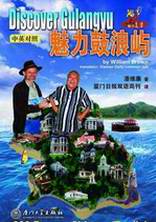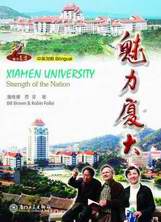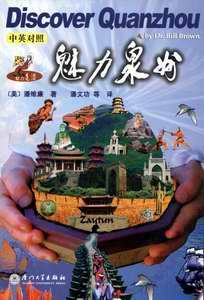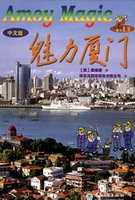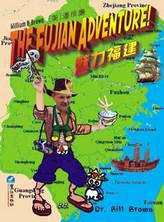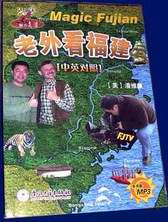![]() Click
to
Access
Click
to
Access
OUTSIDE China
![]() Click
to Access
Click
to Access
INSIDE
China ![]()
TRAVEL LINKS
![]() Xiamen
Xiamen
![]() Gulangyu
Gulangyu
![]() Jimei
Jimei
![]() Tong'an
Tong'an
![]() Jinmen
Jinmen
![]() Zhangzhou
Zhangzhou
![]() Quanzhou
Quanzhou
![]() Wuyi
Wuyi
![]() #1Fujian
Sites!
#1Fujian
Sites!
![]() Fujian
Foto Album
Fujian
Foto Album
![]() Books
on Fujian
Books
on Fujian
![]() Readers'Letters
Readers'Letters
![]() Ningde
Ningde
![]() Zhouning
Zhouning
![]() Longyan
Longyan
![]() Sanming
Sanming
![]() Putian
Putian
![]() Bridges
Bridges
![]() Travel
Info,
Travel
Info,
![]() Hakka
Roundhouses
Hakka
Roundhouses
![]() Travel
Agents
Travel
Agents
MISC. LINKS
![]() Amoy
People!
Amoy
People! ![]()
![]() Darwin
Driving
Darwin
Driving ![]()
![]() Amoy
Tigers
Amoy
Tigers
![]() Chinese
Inventions
Chinese
Inventions
![]() Tibet
in 80 Days!
Tibet
in 80 Days!![]()
![]() Dethroned!
Dethroned!
![]()
![]() Misc.Writings
Misc.Writings
![]() Latest
News
Latest
News
![]() Lord
of Opium
Lord
of Opium
![]() Back
to Main Page
Back
to Main Page
![]() Order
Books
Order
Books![]() Xiamenguide
Forum
Xiamenguide
Forum 
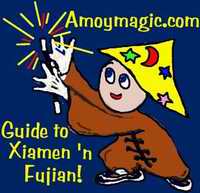
| Xiamen Univ. | 10,000 Rock Botanic Garden | Hong Shan Park | Zhong Shan Park | Nan Pu Tuo Temple | Huli Hill Fort | Island Ring Road | Xin Jie Church | Jimei School Village |
Note: "A
picture's worth 1,000 words!" So check out these beautiful
photos of Xiamen (and Fujian) by award-winning photographer Zhuqing,
Gulangyu
postcards by Mr. Bai Hua, or classic B&W photos of Old
Amoy from the collection of historian
Click Here for Favorite Fujian Destinations
Xiamen University
Welcome
to the beautiful 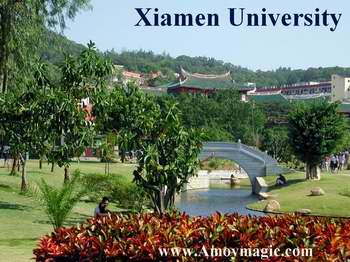 campus
of Xiamen University--a campus by the sea. This is a wonderful place to
stroll around on a sunny morning or afternoon. First head for the lake
in the center of campus. If you walk the paths around the lake you will
discover arched bridges and an island with bronze life-size statues. From
the lake you can see the modern architecture of the new administration
and classroom buildings as well as the original ancient style dormitory
buildings on the opposite sides. Behind those buildings you can hike up
the mountains in the back. There are many trails that lead over the mountain
to the botantical gardens on the other side.
campus
of Xiamen University--a campus by the sea. This is a wonderful place to
stroll around on a sunny morning or afternoon. First head for the lake
in the center of campus. If you walk the paths around the lake you will
discover arched bridges and an island with bronze life-size statues. From
the lake you can see the modern architecture of the new administration
and classroom buildings as well as the original ancient style dormitory
buildings on the opposite sides. Behind those buildings you can hike up
the mountains in the back. There are many trails that lead over the mountain
to the botantical gardens on the other side.
If
you walk to the East of the lake you will find paths leading to the ancient
style original campus classrooms that surround a football stadium which
has a view of the ocean. The ocean and the beautiful beach road are bordering
the campus. There are beautiful walkways along the beach and benches for
a relaxing time contemplating the waves. 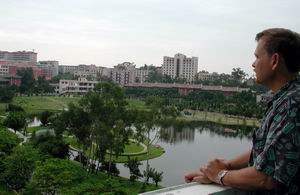
On the North side of campus are the bustling campus stores and many small restaurants. Our favorite restaurant along here is the Lin Duck House. More about that on the Restaurant page. If you want to take a hike over the mountain, the easy path is found by heading straight up the road from the Nan Pu Tuo University Entrance and past the round cafeteria and keep to your left following the road. They have made a stone path the whole way over the mountain and then down into the botanical gardens. You first pass through the military park and veer to the right and down. It is the back way into the Gardens and it used to be free going that way, but now I've heard they charge 20rmb per person.
I
hope you enjoy an outing to the university; it is well worth your time!..C
Back to Top
..... Click
Here to
learn more about Xiamen University!
227 hectare 10,000 Rock Botanical Garden has more
rocks than university cafeteria rice. Millions of tourists and locals
delight in the maze of picturesque paths winding between hills and past
jumbled boulders like "Laughing Rock," many of which bear the
calligraphic inscriptions of the ancients. Tags along the trails give
in Chinese and Latin the names and origins of the plants.
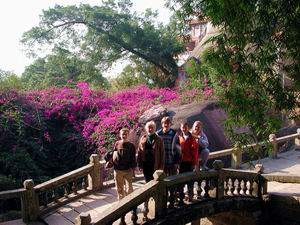 plants.
On the peak overlooking Xiamen University is a Military Museum, as well
as the Buddhist nunnery that explains why centuries of Nanputuo monks
have worn so many trails over the Five Old Men Mountains in search of
enlightenment.
plants.
On the peak overlooking Xiamen University is a Military Museum, as well
as the Buddhist nunnery that explains why centuries of Nanputuo monks
have worn so many trails over the Five Old Men Mountains in search of
enlightenment.
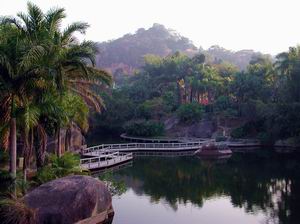
Hongshan Park. It is so quiet there and it seems that
Back
to Top
Click Here for "Monk's
Daily Schedule"
Signs by the lotus-covered pond urge visitors to "Love Xiamen"
or "Beautify Egret Island." On a stone bench behind the bamboo
grove behind the "Cherish flowers and grass" sign, a youth was
cherishing his flower and embracing the maxim to "Love one another."
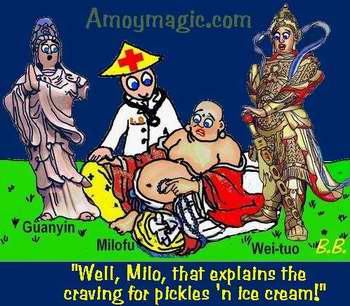
Pot-bellied god Milofu (Maitreya)
greets Nanputuo visitors. Amoy folk like him because he's the god of wealth,
but he appears to be in no hurry to pay up. Buddhist sutras claim that
after Buddha rules for 10,000 years, international morality will be so
high that Buddhism will die out, and Milofu will show up 8 million years
later.
Hell to Pay. Burning a paper replica,
in theory, sends the essence of the real thing to extinguished ancestors
down below. Yellow paper becomes gold; white paper becomes silver. Nowadays,
people burn paper houses, microwaves, television, furniture, cars, Lear
jets-even exquisitely engraved Hell Visa Cards, Hell Passports (with U.S.
visas), and Hell checking account books (not even the Bank of China offers
personal checking yet). Given that Buddhism has 84,136 hells, and needs
may vary, the simplest sacrifice is stacks of Hell Money.
Hell
Money!
For mere pennies, pilgrims can burn stacks of million dollar bills, the
idea being that folks down below can't tell real money from counterfeit.
Even the poorest denizen of hell might rake in more money in one day than
Bill Gates can make in a year, even with his infernal upgrades.
It must make for some hellish inflation down there.
Air Conditioned
Hell?! Click These Thumbnails
for photos of fine paper paraphernalia I've seen for sale: Hell cars,
Hell clothes, Hell phones and rice cookers....even paper Hell air conditioners!
Leave it to the Chinese to try to air condition Hell! By the way... I
asked why anyone would send their extinguished ancestors a paper horse
when they could send them a paper Mercedes just as cheaply. I was told,
"Because they don't know how to drive."
Click These Thumbnails for Larger Hellish Images!
Just
inside Nanputuo's gates (past the beggars yelling, "Laoban! Laoban!"
"Boss! Boss!") are the temple tourist shops. The shaven headed
proprietors were too busy watching a Kung Fu movie to notice me as I inventoried
the paraphernalia that pious Buddhists travel from afar to buy: brass
frogs, plastic and brass Buddhas, chant cassette tapes, Chinese dolls,
newly minted ancient coins, porcelain, fake jade and ivory, carved walking
sticks, embroidered purses, and Buddhist rosaries ranging from 20 Yuan
to 600 Yuan. They also had a broad selection of snacks (for self-consumption
or sacrifices), including Pringles potato chips, soft drinks, mineral
water and Red Bull.
But they wouldn't accept Hell Money.
Nanputuo's South Fujian Buddhist Institute, established in 1924, has over 100 monks burning the Buddhist candle at both ends while studying the Scripture Hall's thousands of rare documents. When they do sleep they probably dream of the Buddhist nunnery on the other side of the mountain-or of fresh fish.
Freeing finned friends destined for wicked woks gains merit for good Buddhists. But one wonders why days, months and years of freeing baskets of carp haven't filled the pond to overflowing. Maybe monks license fishermen to capture and resell the fish-to pious pilgrims, of course, lest they endanger some sole's soul. This could explain how the saffron saints afford their cell phones.
Other meritorious deeds include feeding freed fish or saving serpents from restaurants. Pious pilgrims release the snakes in the hills, where I suspect they make a slithering beeline for our door. A cobra missed me by inches on my back porch, and three times I've surprised bamboo vipers in the bushes. So no wonder I nearly jumped out of my skin when I came across a long slim body stretched across a trail. "It's just a piece of moldy rope, Dad," Shannon said, and he laughed heartily until he realized he was nearing the end of his own rope.
Soy
Be It! Vegetarian
monks are endlessly creative with mock meat dishes. I've had mock sweet
'n sour ribs (with soy bones, no less!), soy chicken with cashews, and
soy duck with peanuts. The rubbery soy snails even have soy poop on their
pointy little ends. The molded, texturized soy fish have head, tail, gills-even
scales. It's a wonder that some pious pilgrim hasn't rescued a few soyfish
and tossed them into the Pond for Freeing Captive Fish.
(Note: try Amoy Magic's awesome Tofu
Recipes--like tofu cheesecake, or double-tofu lasagna!).
Back to Top
Huli
Hill Fort, on the beach outside Xiamen University, 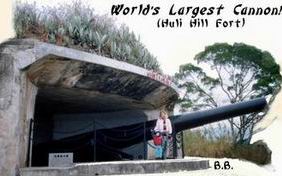 is
built of sand, clay, camphor tree juice, lime, and glutinous rice. It's
not only impregnable but during a long siege probably edible as well.
The fort boasts the World of Exotic Stones and an exhibition of ancient
weapons, including a 60 ton German Krupp. Built by some big shot in 1896,
this is the last of China's over 100 coastal cannons, and the longest
in the world-longer even than the cannon Napoleon abandoned in Moscow
and now on display in the Kremlin. The Kremlin cannon holds Guinness Records'
#1 spot for now-but we're working on correcting that!
is
built of sand, clay, camphor tree juice, lime, and glutinous rice. It's
not only impregnable but during a long siege probably edible as well.
The fort boasts the World of Exotic Stones and an exhibition of ancient
weapons, including a 60 ton German Krupp. Built by some big shot in 1896,
this is the last of China's over 100 coastal cannons, and the longest
in the world-longer even than the cannon Napoleon abandoned in Moscow
and now on display in the Kremlin. The Kremlin cannon holds Guinness Records'
#1 spot for now-but we're working on correcting that!
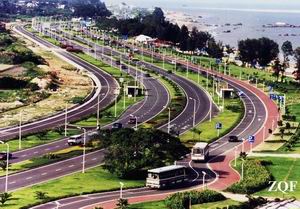 The
Island Ring Road,
just past Huli Hill, has lanes for hikers, bikers, and roller skaters.
The gardens, lawns and picnic areas are perfect for kite flying. With
good binoculars you can see soldiers patrolling Taiwan-controlled Jinmen,
a mere 3 miles offshore.
The
Island Ring Road,
just past Huli Hill, has lanes for hikers, bikers, and roller skaters.
The gardens, lawns and picnic areas are perfect for kite flying. With
good binoculars you can see soldiers patrolling Taiwan-controlled Jinmen,
a mere 3 miles offshore.
Catch the action on Lantern Festival Eve, and Mid Autumn Festival, when
both Jinmen and Xiamen set off spectacular fireworks.
Jinmen-so
close but so far. It's ironic that the entire world can trade freely with
Taiwan and the mainland, yet the mainland and Taiwan must undergo logistical
contortions to trade with each other. I'm looking to both sides implementing
the San Tong so that my wife and I can travel directly to Taiwan and revisit
the place we were married, and perhaps retrace our honeymoon! Back
to Top
No Street Called Straight--Until the 1920s, many of Amoy's half
a million residents lived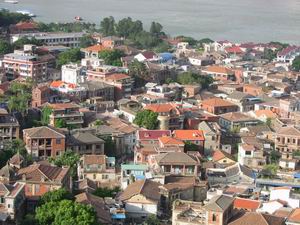 within the city walls, which were 30 feet high and 12 feet broad at the
top. The maze of narrow winding streets amazed foreigners. In 1912, Rev.
Pitcher wrote,
within the city walls, which were 30 feet high and 12 feet broad at the
top. The maze of narrow winding streets amazed foreigners. In 1912, Rev.
Pitcher wrote,
"The streets are narrow and crooked… ever winding and twisting,
descending and ascending, and finally ending in the great nowhere. The
wayfaring man, tho wise, is bound to err therein. There is no street either
straight, or one even called "Straight" in Amoy.
"The in addition to the crookedness, they must add another aggravation
by making some of them very narrow. There are streets in Amoy so narrow
that you cannot carry an open umbrella…"
Some streets were crooked because Chinese once believed devils (perhaps
foreign devils included) could only travel in straight lines. Alas, Amoy's
walls are gone, but some of the back alleys of Gulangyu, and downtown
Xiamen (between Zhongshan and Datong Roads) appear little changed.
The alleys are small and dim, but busy. A sidewalk seamstress uses a black
and gold enameled Butterfly sewing machine that could have been bought
from an 1880 Sears catalog. (Peasants in the mountains even use handmade
iron sewing machines!). A goldsmith huddled over a wooden table repairs
jewelry. A granny perches on a hardware store's steps listening to a blind
banjo player. And without exception they'll all serve you tea that probably
set them back a day's wages, and be happy to do it.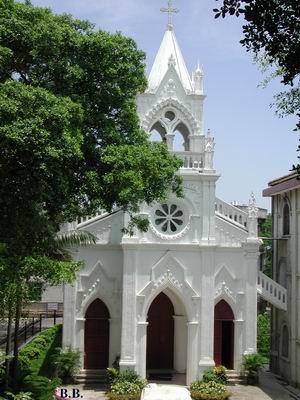
As an electrician performed the elegantly simple Minnan Tea Ceremony,
I asked where he'd learned his excellent English.
"From books," he said. "And listening to the radio. The
same way I learned to repair electric appliances."
"What can you repair?" I asked.
"Anything that's in the books!" he said.
With its intricate web of six lane highways, ring roads, clover leafs
and tunnels, it's hard to imagine that only a decade ago most Xiamen roads
were narrow, dingy and dark. Much has changed. The new Xiamen is much
cleaner and easier to get around in-but it's an education and a step back
in time to stroll umbrella roads and watch vintage gentlemen in long Chinese
coats, beards to their bellies, arms locked behind them, deep in thought.
Tour guides don't tout umbrella roads, but I like them. They lead to treasures
like the first Protestant Church in China.
Back to Top
Xinjie
Church-China's
First Protestant Church!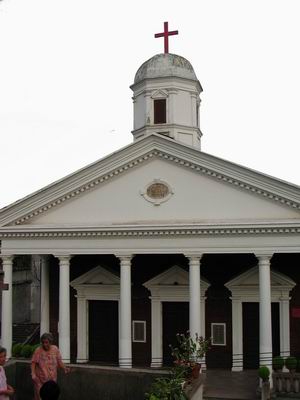
A pictorial on China's Western Religious Architecture says Xinjie Church
brazenly boasts being China's "#1 Church. The authors misread the
plaque. It means Xinjie was China's first protestant church, not the most
important. Hence Xiamen's nickname, "Birthplace of Chinese Protestantism."
Xinjie was built in 1848 on the narrow path behind Zhon`gshan Road (behind
the pharmacy). Today, over 1,000 worshippers pack it out on Sunday mornings
and afternoons. The basement bookstore is especially interesting. China
now prints so many kinds of Bibles and Christian books, so cheaply, that
I've known Chinese Christians from other Asian countries come here to
buy them.
Xinjie is especially festive at Christmas. Many churches (and stores and
restaurants) leave their Christmas trees and plastic Santas up year round,
and Christians and non-Christians alike enjoy the churches' Christmas
Eve concerts. I like the canned Christmas music, which includes classic
hymns like Silent Night, Hark the Herald Angels Sing, Frosty the Snowman
and Jingle Bells.
 Breaking
Wet Noodles I always wondered how Chinese Christians 'break
bread ' together without bread. Maybe hundreds of chopsticks in a giant
rice bowl? Xinjie, it turned out, serves neither rice nor bread, but cold,
wet noodles, cut in little squares, like floppy Scrabble tiles. Its tough
breaking wet noodles but I liked the chewy texture. And one dose of Chinese
wine made it clear why communion cups are so tiny. Alas, Xinjie has modernized.
They now use imported circular flat communion wafers that look and taste
like Styrofoam. Granted, the little crosses stamped on them add a nice
touch. It would be hard to stamp crosses on squares of wet noodle. But
I miss the noodles. Maybe they still use them in Trinity Church on Gulangyu
Islet, our planet's only Piano Island.
Breaking
Wet Noodles I always wondered how Chinese Christians 'break
bread ' together without bread. Maybe hundreds of chopsticks in a giant
rice bowl? Xinjie, it turned out, serves neither rice nor bread, but cold,
wet noodles, cut in little squares, like floppy Scrabble tiles. Its tough
breaking wet noodles but I liked the chewy texture. And one dose of Chinese
wine made it clear why communion cups are so tiny. Alas, Xinjie has modernized.
They now use imported circular flat communion wafers that look and taste
like Styrofoam. Granted, the little crosses stamped on them add a nice
touch. It would be hard to stamp crosses on squares of wet noodle. But
I miss the noodles. Maybe they still use them in Trinity Church on Gulangyu
Islet, our planet's only Piano Island.
Back
to Top
Gulangyu
Island
Click Here for "Discover
Gulangyu"
Also see: Gulangyu Postcards & Gulangyu Architecture
 Piano
Islet! Asia's
Largest Piano Museum is on Gulangyu
Islet, which has delighted Laowai and Laonei for centuries. Xiamen invested
nearly 1 billion Yuan relocating 16 factories off-islet to preserve this
botanical and cultural oasis, which is only a ten-minute ferry ride from
downtown Xiamen.Gulangyu Islet Prohibits Cars and Bikes. Visitors hear
nothing but pounding surf, crying seabirds, shouting vendors selling maps
and handicrafts, pleading beggars (Laoban!-Boss!) -all against the background
of countless children practicing piano.
Piano
Islet! Asia's
Largest Piano Museum is on Gulangyu
Islet, which has delighted Laowai and Laonei for centuries. Xiamen invested
nearly 1 billion Yuan relocating 16 factories off-islet to preserve this
botanical and cultural oasis, which is only a ten-minute ferry ride from
downtown Xiamen.Gulangyu Islet Prohibits Cars and Bikes. Visitors hear
nothing but pounding surf, crying seabirds, shouting vendors selling maps
and handicrafts, pleading beggars (Laoban!-Boss!) -all against the background
of countless children practicing piano.
 The
19th century missionaries arrived in Amoy with bibles in one hand and
pianos in the other. Very big hands, I suspect.
The
19th century missionaries arrived in Amoy with bibles in one hand and
pianos in the other. Very big hands, I suspect.
Gulangyu has more pianos per capita than any place in China-one in every five homes! Graduates of the Amoy Musical Academy and other schools have achieved international recognition, and not a week passes that you can't enjoy a recital or orchestral performance somewhere in town. Xiamen emphasizes Chinese as well as Western classical music. The unique Xiamen Nanyin (Southern Music) Musical Troup preserves and performs the 1000 year old music that Chinese call "living music fossil" and "divine oriental melody."
Gulangyu Sites
Armed with an English Gulangyu map that you'll buy from the hordes of
vendors, and the list of 69 Gulangyu sites in my book "Amoy Magic"
(page 69), you can visit Sunlight Rock, the Overseas Chinese Subtropical
Garden (with over 1,000 species), Underwater World, and take in the broad
variety of Asian and Westerng colonial architecture. Visitors can take
an electric tour car, or should they fancy being a Mandarin for a day,
they can be borne on litters by costumed young men. But the most leisurely
way to see Gulangyu is a stroll around the perimeter-past beaches, tropical
gardens, and exquisite colonial villas once occupied by European merchants,
rich overseas Chinese, and the staff of 13 countries' consulates.
Xiamen
has spent over 76 million Yuan on the Gulangyu Historical Heritage Preservation
Plan to preserve buildings like the three-storied Former Spanish Consulate.
Built in 1850, the oldest embassy building still in existence is now a
hotel. Also interesting are the former U.S. Consulate (1865), and the
Japanese, Dutch and French embassies.
Trinity Church (1930s) has a "neo-classical"
design, and the 1917 Catholic church, beside the former Spanish embassy
is neo-Gothic. (This is the only church in Xiamen with English services.)
The two-storied Danish Telegraph Office is surrounded on all sides by
an arched colonnade. The three-storied Agricultural Bank, erected as a
court in 1905, combines many European styles. Huang Rongyuan's three-storied
mansion, on Fujian road, is said to resemble a 17th century Italian palazzo
(townhouse).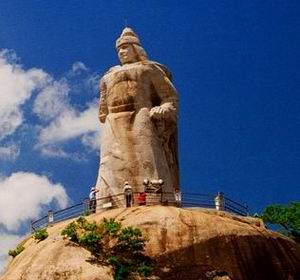
The
Koxinga statue and Sunlight Rock
(accessible by cable car or 93 millions steps) are Gulangyu's trademarks.
From Sunlight Rock, the great patriot directed his troops' training. From
Sunlight Rock's peak you can steal a great glimpse of Gulangyu and Xiamen
Island. And after you've forked out 40 Yuan to climb the rock you'll really
wish you'd just stolen that great glimpse.
Famous Foreigners. Laowai have been
visiting Amoy for over 700 years, and many famous foreigners, as well
as Chinese like the esteemed writer Lin Yutang, have done time in Amoy.
"Father
of Tropical Medicine"
The adventurous Scotsman Patrick Manson, made his epic medical discoveries
here in Xiamen. At first, locals were suspicious of Dr. Manson's claim,
"I've come to serve you!" "Serve us for dinner is more
likely!" they probably thought. For centuries, the Chinese had heard
rumors about red-haired barbarians stewing Chinese babies, or using their
eyeballs to make mirrors.
 The
practical Scotsman opened his clinic to the street so everyone could see
what he was really up to. But Chinese were not reassured when he sliced
open patients with a scalpel-which for all they knew came in sets, with
a fork and spoon.
The
practical Scotsman opened his clinic to the street so everyone could see
what he was really up to. But Chinese were not reassured when he sliced
open patients with a scalpel-which for all they knew came in sets, with
a fork and spoon.
The mosquito-malaria connection was first suspected by Dr. Manson right here on Xiamen! He researched ailments by dissecting everything from cats and dogs to birds and insects. Chinese abhorred the very idea of taking a cleaver to a cadaver, so the good doctor cut open a corpse in the graveyard, in the dead of night. Brave man. But he never messed with magpies! Chinese Chinese revered magpies because an ancient Emperor had supposedly entered one after death.
Dr. Manson defeated diseases that had baffled other Western doctors. And he won the trust of locals, who lined up by the hundreds outside his clinic. After he left Amoy for Hong Kong, Dr. Manson founded a medical society and the Hong Kong College of Medicine. One early pupil was none other than Sun Yat-sen!
Koxinga, Tan Kak Kee, Sun-Yat-Sen, Manson, Brattain, and many others have helped Xiamen make quite an impact on this little planet. Xiamen even helped America gain independence by catering the Boston Tea Party (the Anxi tea went out through Amoy harbor).
Amoy
suffered a century of foreign occupation, and even when our family arrived
in '88, what is now the beautiful ring road was just a dirt road winding
through military camps. But Xiamen has turned her swords into ploughshares
and roads (and pillboxes into beach houses!). Now Shannon and Matthew
can stand down.
Good job, men!
"Miraculous!"
former U.S. President Jimmy Carter said. He was speaking of the exquisite
in-side painting technique used traditionally on snuff bottles and globes-one
of the many crafts that foreign shoppers snap up on Gulangyu Islet. Glass
Christmas balls, also painted from the inside, are as up to snuff as the
snuff bottles. And they will hand paint your name on the inside of any
of these items!
Exotic paper parasols conjure up images of Japanese geishas, but they
originated centuries ago right here in Fujian. Japanese are so taken by
oiled paper parasols that they even use giant versions as beach umbrellas.
Blend Chinese calligraphy with Chinese Painting and you'll have the art
practiced by several artists who will transform your name, whether it
be Bob or Bartholomew, or anything else you care to say in a unique way,
into a lovely work of Chinese art!
The Pearl of Great Price must have been on Gulangyu because one
of our American visitors spent $2,500 on pearls at Pearl
World! I can't tell a real pearl from paste costume jewelry,
but Laowai in the know claim Pearl World has the best prices and selection,
and are reliable. Whether this is true or not, the Pearl World owners
were certainly happy about the big sale, and gave me a free pair of earrings!
But I've never worn them; I wasn't in California that long. 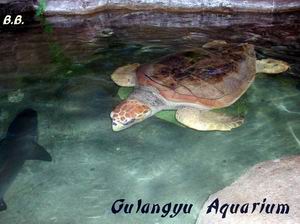
Gulangyu
Aquarium! See sea creatures when you've seen enough of
everything else! Gulangyu's aquarium,
one of China's best, has a greater variety of sealife than you'll find
anywhere outside a Cantonese restaurant. 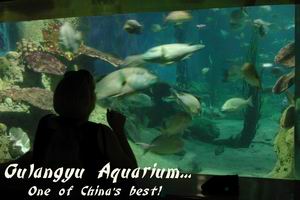
People
#1! For all the sightseeing and shopping, Gulangyu's greatest attraction
remains her people. These friendly folk are never to busy to stop in their
tracks, even when so busy they're in danger of derailing, and inviting
you to "Have some tea!" Which brings us to the subject of pots.
If
you're going to pot, you might want to check out Gulangyu shops' endless
selection of teapots! Every size and shape imaginable. Every price too.
Some cost thousands of Yuan, but they are said to not only to improve
the tea but also to cure all that ails you.
Just off Island--
Back to Top
Jimei School Village
Across
the causeway from Xiamen is Tan Kah Kee's home and tomb ("The Turtle
Garden"). Mr. Tan's memorial has an incredible display of stone relief
carvings with intricate details, carved by stonemasons from Hui'an (next
chapter). One reminds me of a Socialists 'Last Supper.'
Ancient Tong An is half an hour north of Jimei. Centuries ago, Xiamen
was part of Tong An, whose claim to fame lies in being the residence of
Su Song, who 1,000 years ago invented the first astronomical clock, and
compiled the influential Materia Medica. The Confucian temple has an interesting
museum, and a large display of ancient carvings, including one that reminds
me of Garfield cat. But everything else was invented in China so why not
Garfield as well?
Tong An also boasts several unique temples, a waterfall, and a newly discovered
Hakka homestead.
Across the Xiamen suspension bridge, in Haicang, the Safari Park is the closest I've gotten to Australia yet! Kangaroos, emus-and some snakes big enough to get revenge on connoisseurs of serpent soup.
Qingjiao
Ciji Palace,
in Haicang, was built in memory 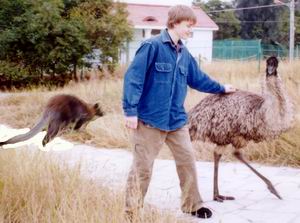 of
the legendary Song Dynasty physician Wu Tao. He even cured Emperor Rengzong's
mother!
of
the legendary Song Dynasty physician Wu Tao. He even cured Emperor Rengzong's
mother!
Commoners were not allowed to touch royalty, so he had her hold one end
of a silk thread, and he felt her pulses through the other end. Her life
was literally hanging by a thread, but he saved her.
After
his death, he was proclaimed a "medical saint," and grateful
villagers pooled their funds to build a hall and statue in his memory.
In 1161, the Emperor gave the Hall the title of Ciji Temple, and in 1241
it was renamed Ciji Palace.
![]() Favorite
Fujian Sites
Favorite
Fujian Sites ![]() Fujian
Foto Album
Fujian
Foto Album ![]() Xiamen
Xiamen
![]() Gulangyu
Gulangyu
![]() Fujian
Guides
Fujian
Guides ![]() Quanzhou
Quanzhou
![]() Zhangzhou
Zhangzhou
![]() Longyan
Longyan
![]() Wuyi
Mtn
Wuyi
Mtn ![]() Ningde
Ningde
![]() Putian
Putian
![]() Sanming
Sanming
![]() Zhouning
Zhouning
![]() Taimu
Mtn.
Taimu
Mtn. ![]() Roundhouses
Roundhouses
![]() Bridges
Bridges
![]() Jiangxi
Jiangxi
![]() Guilin
Guilin
![]() Order
Books
Order
Books
![]() Readers'
Letters
Readers'
Letters
Last Updated: May 2007
![]()
DAILY
LINKS
![]() FAQs
Questions?
FAQs
Questions?
![]() Real
Estate
Real
Estate
![]() Shopping
Shopping
![]() Maps
Maps
![]() Bookstores
Bookstores
![]() Trains
Trains
![]() Busses
Busses
![]() Car
Rental
Car
Rental
![]() Hotels
Hotels
![]() News
(CT)
News
(CT)
![]() Medical
& Dental
Medical
& Dental
![]() YMCA
Volunteer!
YMCA
Volunteer! ![]()
![]() XICF
Fellowship
XICF
Fellowship
![]() Churches
Churches
![]()
![]()
![]() Temples
Temples![]()
![]() Mosque
Mosque
![]() Expat
Groups
Expat
Groups
![]() Maids
Maids
![]() Phone
#s
Phone
#s
EDUCATION
![]() Xiamen
University
Xiamen
University
![]() XIS(Int'l
School)
XIS(Int'l
School)
![]() Study
Mandarin
Study
Mandarin
![]() CSP(China
Studies)
CSP(China
Studies)
![]() Library
Library
![]() Museums
Museums
![]() History
History
DINING
![]() Restaurants
Restaurants
![]() Asian
Asian
![]() Veggie
Veggie
![]() Junk
Food
Junk
Food
![]() Chinese
Chinese
![]() Italian
Italian
![]() International
International![]()
![]() Visas
4 aliens
Visas
4 aliens
RECREATION
![]() Massage!
Massage!
![]() Beaches
Beaches
![]() Fly
Kites
Fly
Kites
![]() Sports
Sports
![]() Boardwalk
Boardwalk
![]() Parks
Parks
![]() Pets
Pets
![]() Birdwatching
Birdwatching
![]() Kung
Fu
Kung
Fu ![]() Hiking
Hiking
![]() Music
Events
Music
Events
![]() Festival&Culture
Festival&Culture
![]() Humor&
Humor&![]() Fun
Fotos
Fun
Fotos![]()
BUSINESS
![]() Doing
Business
Doing
Business
![]() Jobs!(teach/work)
Jobs!(teach/work)
![]() Hire
Workers
Hire
Workers
![]() Foreign
Companies
Foreign
Companies
![]() CIFIT
(Trade Fair)
CIFIT
(Trade Fair)
![]() MTS(Translation)
MTS(Translation)
![]()
Back to Top
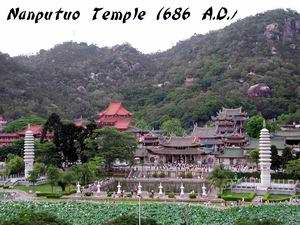

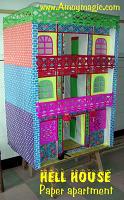


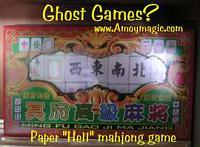
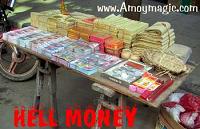
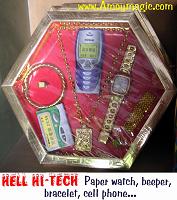
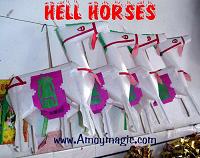
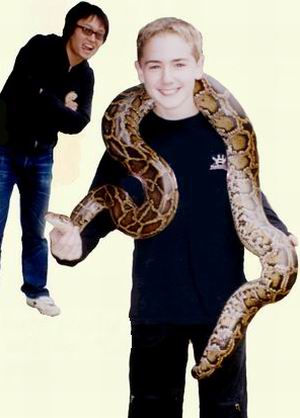 Xiamen
Haicang Safari Park
Xiamen
Haicang Safari Park